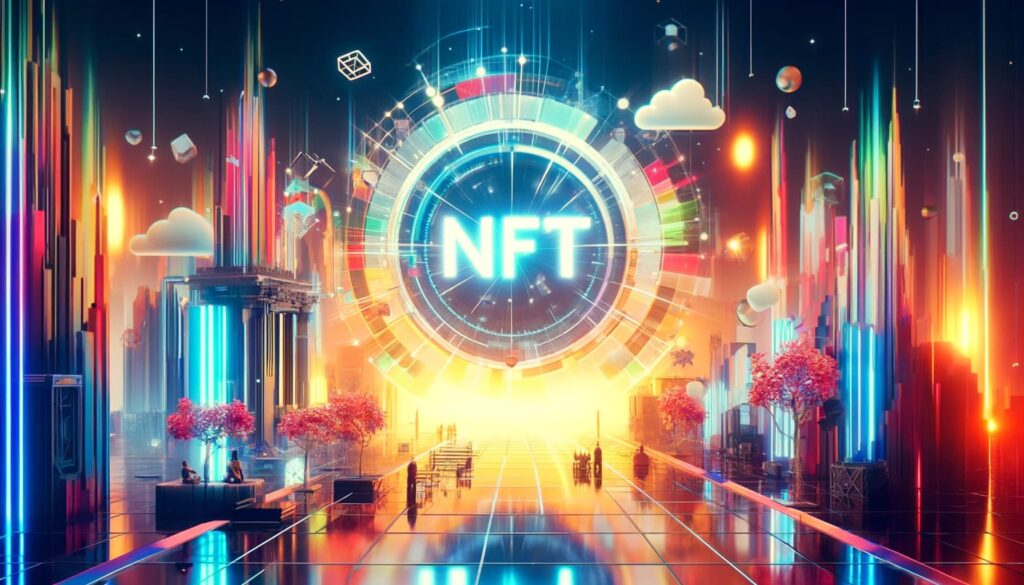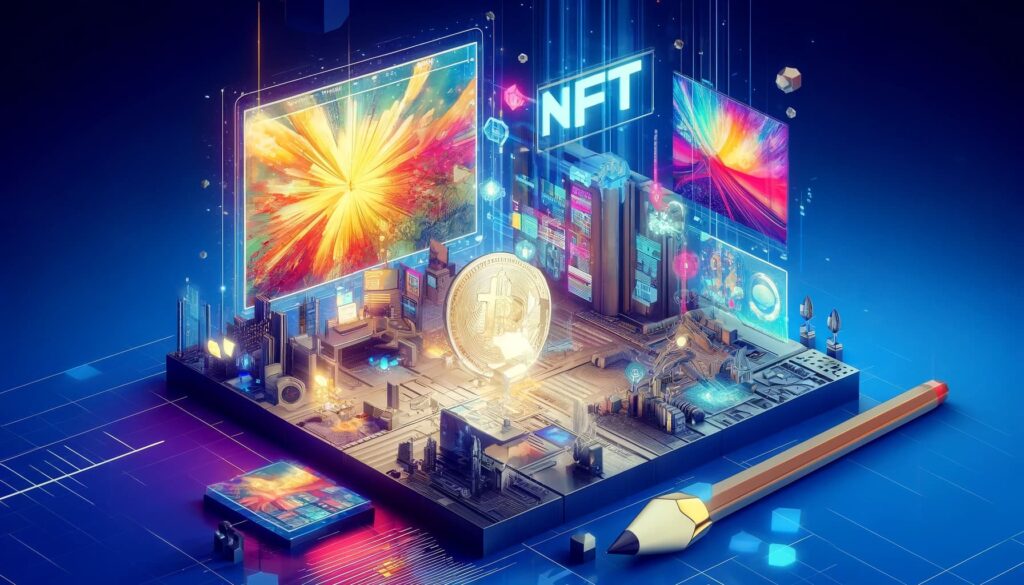NFT Wallets for Buyers
As the world of digital collectibles continues to expand, understanding how to securely store and manage your Non-Fungible Tokens (NFTs) is crucial. NFT wallets, specialized digital wallets designed to hold NFTs, play a vital role in this ecosystem. In this blog post, "NFT Wallets for Buyers," we will explore the various types of NFT wallets, their essential features, and how to choose the right one for your needs. Whether you are a novice collector or an experienced investor, this guide will provide you with the knowledge to safeguard your digital assets effectively and navigate the NFT marketplace with confidence.
A Crucial Role in the World of NFTs
NFT wallets play a crucial role in the world of non-fungible tokens (NFTs) by providing a secure and convenient way to store, manage, and exchange these unique digital assets. As NFTs gain popularity as digital collectibles, art pieces, and even virtual real estate, it becomes imperative to have a dedicated wallet that can support these blockchain-based assets.

One of the key features typically offered by NFT wallets is support for different blockchain protocols. NFTs are created and traded on various blockchains such as Ethereum, Binance Smart Chain, and Flow. Thus, having a wallet that can seamlessly interact with multiple blockchains allows users to access a wider range of NFTs and take advantage of different marketplaces and platforms.
Additionally, NFT wallets often provide users with the ability to access NFT websites and marketplaces directly from the wallet interface. This integration allows users to easily browse, buy, and sell NFTs without the hassle of multiple logins or complicated transactions. It simplifies the process of managing NFTs and enhances the user experience.
Crucially, NFT wallets also ensure secure ownership and proof of authenticity. Each NFT has a unique digital signature that proves its authenticity and verifies the ownership. NFT wallets securely store these signatures, providing users with peace of mind knowing that their NFTs are protected from theft or unauthorized access.
NFT wallets are essential tools for anyone involved in the world of non-fungible tokens. They offer support for different blockchains, facilitate access to NFT websites and marketplaces, and ensure ownership and proof of authenticity of these unique digital assets.
Importance of NFT wallets for buyers
NFT (Non-Fungible Token) wallets play a crucial role for buyers in the world of digital assets. These wallets provide a secure way for individuals to access and trade their NFTs, ensuring peace of mind in the process.
One of the primary features of NFT wallets is the provision of a private key. This key acts as a digital signature that authorizes transactions. It offers an additional layer of security, essentially acting as a digital lock that only the owner possesses. With this private key, buyers can be confident that their NFT transactions are protected from unauthorized access.
NFT wallets often incorporate two-factor authentication (2FA), which further enhances security. This authentication method requires users to provide two pieces of evidence before accessing their wallets, such as a password and a unique code sent to their registered email or mobile device. This protects buyers from potential hacking attempts and serves as an added security measure.
Using an NFT wallet has several benefits for buyers. Firstly, it allows for easy tracking of assets. Buyers can conveniently view their collection of NFTs and monitor their value, ensuring transparency and easy management. Additionally, these wallets usually come with a user-friendly interface, making it simple for buyers to navigate through their digital assets and engage in seamless transactions.
NFT wallets are of utmost importance for buyers due to their ability to provide secure access and trade of NFTs. They offer private keys for transaction authorization and augment security through two-factor authentication. Furthermore, the benefits of tracking assets and user-friendly interfaces make NFT wallets an essential tool for buyers in the digital asset landscape.
Understanding NFT Wallets
Cryptocurrency and blockchain technology have revolutionized the way we transact and manage digital assets. Non-Fungible Tokens (NFTs) are one such innovation that has gained significant traction in recent years. NFTs are unique digital assets that can represent ownership of a wide range of items, including digital art, collectibles, virtual real estate, and more. To securely store and manage these digital assets, users need NFT wallets. NFT wallets are digital wallets specifically designed to support the storage and transfer of NFTs.
These wallets ensure the safekeeping of NFTs by providing users with a private key that grants access to their digital assets. Importantly, NFT wallets also enable seamless interaction with NFT marketplaces, allowing users to buy, sell, and trade NFTs with ease. Understanding NFT wallets is crucial for anyone interested in participating in the growing world of digital collectibles and art. By grasping the fundamentals of NFT wallets, individuals can confidently navigate this emerging space and make informed decisions regarding their NFT investments.
What are NFT wallets?
NFT wallets, or non-fungible token wallets, are digital wallets specifically designed to interact with and facilitate the trading of digital collectibles on the blockchain. Unlike traditional wallets that store and manage cryptocurrencies, NFT wallets focus solely on managing and showcasing these unique digital assets.
The primary purpose of NFT wallets is to provide a secure and convenient way for users to access and trade their digital collectibles. These wallets act as a gateway to the blockchain, allowing users to view and manage their NFTs directly from their wallet interface. They provide a user-friendly interface that simplifies the process of buying, selling, and transferring these digital assets.
It's important to note that NFT wallets do not technically store the actual NFTs themselves. Instead, they store the private keys and addresses that grant users access to their NFTs on the blockchain. The NFTs are actually stored on the blockchain itself, which serves as a decentralized ledger that records and verifies the ownership and authenticity of these digital collectibles.
NFT wallets serve as a vital tool for accessing and trading digital collectibles on the blockchain. With the rise of NFTs, these wallets provide a seamless and secure means of managing and showcasing these unique assets, enabling users to participate in the growing market of digital collectibles.
Definition and purpose of NFT wallets
NFT (Non-Fungible Token) wallets have emerged as an integral component of the rapidly expanding blockchain ecosystem. These digital wallets serve as secure storage solutions for NFTs, which are unique digital assets that cannot be exchanged on a one-to-one basis like cryptocurrencies. NFT wallets provide individuals with a secure space to store, manage, and trade their digital collectibles, artwork, and other unique assets represented in the form of NFTs. As the popularity of NFTs continues to soar, it becomes essential to understand the definition and purpose of NFT wallets to fully grasp the significance they hold within this growing market. In this article, we delve into the definition and purpose of NFT wallets, shedding light on the critical role they play in facilitating the ownership and transaction of NFTs.
Types of NFT wallets
NFT wallets are digital wallets that are specifically designed for storing and managing non-fungible tokens. There are three main types of NFT wallets: hardware wallets, software wallets, and vaults.
Hardware wallets are physical devices that provide the highest level of security for storing NFTs. They are usually in the form of USB devices or smartcards. Hardware wallets store the private keys required to access and transfer NFTs offline, making them less vulnerable to hacking or online threats. These wallets also often come with additional security features like PIN codes or biometric authentication.
Software wallets are digital applications or platforms that can be installed on computers, smartphones, or tablets. They offer convenient access to NFTs as they are accessible online. Software wallets can either be custodial, meaning the NFTs are stored on a third-party server, or non-custodial, where users have full control over their private keys and NFTs.
Vaults are specialized NFT storage solutions that prioritize security. They are designed to keep NFTs offline, similar to hardware wallets. Vaults use multi-signature technology, which requires multiple parties to authorize any transaction, making it extremely difficult for hackers to gain access. Vaults are often used by institutions or individuals with a large number of valuable NFTs, as they provide robust protection against theft.
NFT wallets come in different forms, depending on the level of security and convenience required by the users. Hardware wallets offer the highest security by storing NFTs offline, while software wallets provide online accessibility. Vaults go a step further in enhancing security by using multi-signature technology. Ultimately, the choice of NFT wallet depends on the individual's needs and preferences.
Overview of different kinds of NFT wallets available
NFT wallets come in various forms to cater to different users' needs. The most common types include hardware wallets, software wallets, and vaults. Each type offers unique characteristics and advantages.
Hardware wallets are physical devices that store NFTs offline, providing the highest level of security. They utilize cryptography to safeguard private keys, ensuring protection against hacking attempts. With cold storage, these wallets keep NFT assets disconnected from the internet when not in use, minimizing the risk of online threats. However, hardware wallets may lack convenience for frequent traders due to the need for physical access to the device.
On the other hand, software wallets are digital applications that can be installed on computers or mobile devices. They offer convenience and quick access, allowing users to manage their NFTs anytime, anywhere. Software wallets store private keys securely on the device or in the cloud, enabling seamless transactions. However, their reliance on internet connectivity increases the vulnerability to cyberattacks.
Lastly, vaults are specialized wallets designed for enhanced security. They combine the benefits of hardware and software wallets, providing users with a secure and user-friendly experience. Vaults often offer multi-platform support, allowing users to access their NFTs across different devices. Additionally, some vaults, like Metamask, have integrated swap features that enable seamless token exchanges within the wallet interface.
The different types of NFT wallets cater to different preferences and requirements. Hardware wallets prioritize cold storage and security, software wallets emphasize convenience and quick access, and vaults combine the benefits of both while offering additional features like multi-platform support and swap capabilities.
Choosing the Right NFT Wallet
When it comes to navigating the world of Non-Fungible Tokens (NFTs), one key consideration is finding the right NFT wallet. NFTs have gained significant popularity in recent years, allowing individuals to own and trade unique digital assets. However, ensuring the security and accessibility of these assets requires choosing a suitable NFT wallet. With numerous options available, selecting the right one can be a daunting task. This article will guide you through the essential factors to consider when choosing an NFT wallet, such as compatibility, security features, user experience, and community support. By understanding these key aspects, you will be equipped to make an informed decision and confidently enter the world of NFTs while keeping your digital assets safe and easily accessible.
Factors to consider when selecting an NFT wallet
When selecting an NFT wallet, there are several essential factors to consider.
Firstly, it is important to choose a wallet that supports your favorite NFT marketplaces. Ensure that the wallet is compatible with the specific platforms you use to buy, sell, or trade NFTs. This will allow for seamless integration and easy management of your NFT assets.
Another crucial factor is strong security. Look for a wallet that offers robust security features such as multi-factor authentication, encryption, and offline storage options. Protecting your NFT investments should be a top priority.
A user-friendly interface is also important. The wallet should have a simple, intuitive design that makes it easy to navigate and manage your NFT assets. This can enhance the overall user experience and streamline your interactions with the NFT marketplace.
Compatibility with multiple chains is another factor to consider. Different NFTs can exist on various blockchain networks, so ensure that the wallet you choose supports the chains you are interested in. This will allow you to access and manage a wide range of NFT collections.
Lastly, the ability to create and display NFT collections should be considered. Look for a wallet that allows you to easily create and showcase your own NFTs, as this can be a valuable feature for artists and creators.
By considering these factors, you can select an NFT wallet that meets your specific needs and preferences, providing a secure, user-friendly, and versatile platform for managing your NFT investments.
Security features
That should be included in an NFT wallet, given the importance of keeping NFTs safe and secure. Additionally, explain the significance of security best practices such as 2FA and the necessity of having a seed phrase for the NFT wallet.
When it comes to NFTs, ensuring the security of one's assets is of utmost importance. To achieve this, NFT wallets should incorporate robust security features. Firstly, a reliable NFT wallet should offer strong encryption protocols to protect the user's private keys and NFT data from potential attacks or unauthorized access. This ensures that only the rightful owner can access their NFTs.
Secondly, enabling two-factor authentication (2FA) is paramount for an NFT wallet. By requiring users to input a password and a verification code from their registered device, 2FA adds an extra layer of protection. It reduces the risk of unauthorized individuals gaining access to the wallet even if they somehow obtain the login credentials.
Another crucial security feature for an NFT wallet is the provision of a seed phrase. A seed phrase, typically comprised of 12 or 24 randomly generated words, acts as a backup and recovery tool. It helps users regain access to their NFTs if they lose their wallet or the device it's stored on. By writing down the seed phrase and storing it securely offline, users can easily recreate the wallet and restore their assets.
An NFT wallet should incorporate strong encryption protocols, 2FA, and the ability to create and store a seed phrase to ensure the utmost security of its users' valuable NFT assets. By implementing these security features and adhering to best practices, NFT holders can have peace of mind knowing that their digital collectibles are safe and secure.
User-friendly interface
A user-friendly interface for NFT wallets should prioritize simplicity and clarity to ensure a smooth user experience. Key features such as clear navigation, intuitive icons, and a minimalist design enable users to easily understand and access the various functions of the wallet. The design elements should focus on providing a clean and organized layout with clearly labeled sections.
The arrangement of each segment with instructional copy plays a vital role in enhancing the user experience. For example, having a prominent "Create Wallet" or "Import Wallet" button helps beginners start their journey easily. Each segment should be accompanied by instructional copy that provides clear and concise guidance on how to carry out specific tasks. This helps beginners navigate through the wallet's features, ensuring they can easily understand and perform actions with confidence.
A good NFT wallet should allow beginner blockchain users to easily carry out activities such as creating a new wallet, importing an existing wallet using a recovery phrase or private key, viewing and managing their NFT collections, buying and selling NFTs with clear instructions, and seamlessly connecting to various blockchain networks. Additionally, the wallet should provide easy access to transaction history, account balances, and security features like two-factor authentication or hardware wallet integration.
A user-friendly interface for NFT wallets should possess key features, design elements, and clear instructional copy to create a smooth user experience. Combining intuitive navigation, minimalistic design, and easily understandable instructional copy allows beginners to confidently perform essential activities within the wallet.
Compatibility with different blockchains
Trust Wallet is a multi-blockchain wallet that offers compatibility with various blockchains, including Ethereum (ETH) and Binance Smart Chain (BSC). Ethereum is one of the most well-known blockchains and Trust Wallet fully supports it, allowing users to store, send, and receive ETH-based tokens. Additionally, Trust Wallet is compatible with non-fungible tokens (NFTs) such as ERC721 and ERC155. These tokens, which are unique and indivisible, can be securely stored and managed within the wallet.
Trust Wallet also offers compatibility with the Binance Smart Chain (BSC), a blockchain developed by Binance. The wallet supports BEP721 and BEP1155 tokens, which are the BSC equivalent of ERC721 and ERC1155 tokens on Ethereum. This means that Trust Wallet users can store, send, and receive NFTs on BSC as well.
By being compatible with multiple blockchains, Trust Wallet provides its users with a versatile and comprehensive solution for managing their digital assets. It allows for seamless integration with various tokens and ensures that users have access to a wide range of blockchain functionalities. Whether it's ETH-based tokens on Ethereum or BEP721 and BEP1155 tokens on Binance Smart Chain, Trust Wallet ensures compatibility and convenience for its users.
Popular NFT Wallets for Buyers
As the world of cryptocurrency continues to evolve, non-fungible tokens (NFTs) have emerged as a popular form of digital asset. NFTs represent unique items, such as artwork, music, videos, or virtual real estate, and their ownership is recorded on blockchain networks. To store, manage, and trade NFTs, buyers require a specialized digital wallet designed specifically for these unique assets. In this article, we will explore some of the most popular NFT wallets available for buyers, highlighting their key features, security measures, and user-friendly interfaces. Whether you are a seasoned NFT enthusiast or a curious newcomer, finding the right wallet is crucial for a seamless and secure NFT ownership experience.
Trust Wallet
Trust Wallet is a leading NFT wallet that stands apart from its competitors due to its key features and benefits. One of its standout qualities is its secure and user-friendly interface. Trust Wallet employs multiple layers of encryption and security measures to ensure that users' NFT assets are protected from any potential threats. This gives users peace of mind knowing that their valuable digital collectibles are safe.
Additionally, Trust Wallet offers cross-chain functionality, which enables seamless transfers of NFTs between different blockchain networks. This means that users can easily move their NFTs from one blockchain to another without any hassle or limitations. This feature is particularly beneficial for collectors who want to diversify their NFT holdings across multiple blockchains.
Trust Wallet's integration with decentralized finance (DeFi) provides users with access to a wide range of financial services and opportunities. With Trust Wallet, users can leverage their NFT assets to participate in DeFi protocols, including lending, borrowing, and earning interest. This integration unlocks the potential for users to maximize the value of their NFTs and take advantage of the growing DeFi ecosystem.
Trust Wallet offers a secure and user-friendly NFT wallet experience with its cross-chain functionality and integration with decentralized finance. These key features and benefits make Trust Wallet a top choice for NFT collectors and enthusiasts looking to seamlessly manage, transfer, and maximize the value of their NFT assets.
Features and benefits for buying NFTs
NFTs, or non-fungible tokens, have surged in popularity due to their unique features and numerous benefits. One of the most significant advantages of buying NFTs is the ability to verify their authenticity and ownership. Utilizing blockchain technology, NFTs provide an irrefutable proof of ownership, ensuring that the purchased item is genuinely unique and cannot be replicated.
NFTs offer access to a wide array of unique marketplaces. These platforms allow buyers to explore and engage with a diverse range of digital art, collectibles, and other virtual assets. The exclusivity and scarcity of the items available in these marketplaces create a dynamic and thrilling experience for collectors and enthusiasts.
Another key benefit of buying NFTs is the cost advantage of minting them. Minting an NFT involves creating a digital certificate that represents ownership of a particular item or artwork. Compared to traditional physical counterparts, minting NFTs can be a more cost-effective option for creators, as it eliminates the need for physical production, storage, and transportation.
Additionally, purchasing NFTs often offers the convenience of using credit and debit cards as payment methods. This accessibility allows buyers to effortlessly acquire their desired digital assets without the hassle of other transaction methods.
The features and benefits of buying NFTs encompass verifying authenticity and ownership, accessing unique marketplaces, cost advantages through minting, and the option to purchase easily using credit and debit cards. These factors contribute to the appeal and growing popularity of NFTs in the digital art and collectibles industry.


